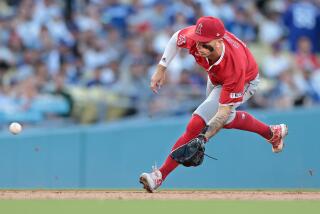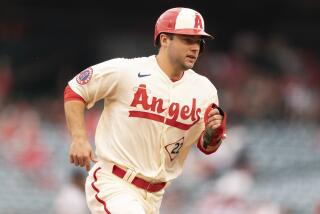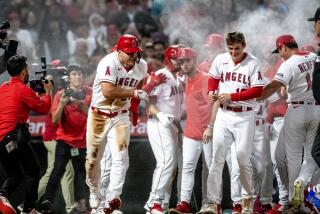THE PROJECT : Devon White Was Given the Gift of Great Speed--and the Grit to Work Hard
MESA, Ariz. â He has been clocked in the 60-yard dash in 6.4 seconds and has stolen 107 bases over the last two seasons, but Devon White wasnât always an expert in rapid transit.
Just ask him about that bus in Davenport, Iowa, in 1982.
âIâd rather not talk about it,â he says with an embarrassed grin.
White was a 19-year-old outfielder playing for the Angelsâ Danville Rookie League team when, on a hot July afternoon, he inadvertently became a rookie bus driver. Seeking a way to beat the heat, White hopped onto the team bus to turn on the air conditioner.
This being the low minors, the bus was of considerable vintage, coming equipped with push-button ignition and air brakes. White knew that to activate the air conditioning, he had to start the bus. What White didnât know was that the bus was parked in gear while the regular driver ate breakfast in the hotel coffee shop.
So when White punched the starter, the bus started moving. And with no air in the air brakes, there was no way to stop it.
The bus rolled for about 20 feet and crashed into a retaining wall. Good thing it did, too. Were it not for the wall, the bus would have belly-flopped into the hotel pool. As it was, the bus stopped inches short of the water.
Today, White refuses to confirm or deny the tale. âYou hear a lot of stories,â he said. Whiteâs official version? âI was just sitting on the bus and it started moving.â
Yeah, right, said Whiteâs Danville teammates, who immediately christened driver Devon with a nickname that still shadows him.
âThey call me âBussie,â â White said.
Bill Bavasi, the Angelsâ director of minor league operations, laughs when he recounts the incident in 1982, but that bus nearly got White busted.
âI was smoked when I heard about it,â Bavasi said. âThe bus was damaged. We couldnât get it out of gear and had to call in another one. I sent Devon home. I told him, âGet a job and pay for it.â â
White was suspended for the rest of the season. âThe bus was covered by insurance,â Bavasi said, âbut we did it for disciplinary reasons. It was one simple screw-up by a good kid.â
Whiteâs reaction?
âHe called me several times wanting to know if he could pay for it,â Bavasi said. âHeâd say, âLetâs work out a payment plan.â He was good about it.â
In talking to those who know him, thatâs typical Devon White. If something is wrong, letâs correct it. If work must be done, letâs get to work.
And for White to get from Danville to the brink of his first full big-league season, much work had to be done.
Angel Manager Gene Mauch minces no words when he recalls the first time he saw White play during the 1981 Arizona Instructional League.
âHe was the rawest professional baseball player I had ever seen,â Mauch said. âI mean, the rawest .
âDevo didnât know a thing about swinging a bat. He could throw the ball, but he didnât know where it was going. He could only do one thing like a big-league ballplayer--and that was run.â
See, at the time, White was strictly a product of his environment. For the first nine years of his life, White lived in Kingston, Jamaica. He spent the next nine learning to adapt to life on the New York streets.
Baseball was actually a fourth sport for White. In Jamaica, he played cricket and soccer. In New York, there was basketball. And lots of it. White found the best way to make friends in the big city was to make baskets. With his running and jumping ability--âI can dunk, very easily,â the 6-1 White notes with pride--he quickly became a force on the local playgrounds.
Baseball? That was something his dad watched on television, kind of like that stickball game his Latino friends down the block would play.
âI didnât get into baseball until I was probably 13 or 14,â White said. âI was more involved with basketball. Baseball was something I played with some of my Spanish friends, just to have something to do.â
He learned the rudiments by swinging at a handball with a sawed-off broomstick. âNew York City stickball,â White said.
White went on to letter all four years at Park West High School and managed to hit .330 as a senior. But basketball remained his sport of choice and expertise. White averaged 15 points a game but received few college offers. There wasnât much demand in the Big East for 6-foot 1-inch forwards.
Oklahoma State wanted White to come out and play both sports and White considered doing so until the Angels, drafting âa project,â made him a sixth-round choice in the June, 1981, draft. Anaheim sounded a lot better than Stillwater, so White signed with the Angels.
When the Angels got White, they didnât know what to do with him. He looked like, well, a basketball player. âHe was built like a 1-iron,â Mauch said. They tried him at third base, which proved a colossal bust. âWe were kind of nuts to play him there,â Bavasi said. âBut San Diego tried (Dave) Winfield at shortstop one year. With good athletes, you try anything.â
Wisely, they moved him to the outfield.
âHe took to center field right away,â Bavasi said. âBut we still werenât sure he could hit.â
Two years in the minor leagues provided no evidence. White batted .179 at Idaho Falls and .215 at Danville. But so much foot speed is a terrible thing to waste. The Angels brought in extra help.
âIâve never seen a minor-league staff work so hard on one player and that player show so much improvement,â Mauch said. âThey worked countless hours with him. And Devon, thereâs a lot of blue collar in him. Itâs âWhat do you want me to do, how much do you want me to do and for how long do you want me to do it? And if I donât think Iâve got enough of it, Iâll have some more.â â
By 1986, White had developed into a .291 hitter with 14 home runs and 60 RBIs in 112 games at Edmonton. And this spring, White has looked like Wally Joyner revisited, hitting .421 with 5 doubles, 2 triples and 6 RBIs in the Angelsâ first nine games.
Mauch calls the progress made in five years âunbelievable. He could do one thing when he got here--run--and our coaches took that and parlayed it into a damn fine ballplayer.â
How fine? The Angels believe that with White, the organization will bring home the American League Rookie of the Year award that Joyner narrowly missed in 1986. Scouts have called him a Willie Wilson with power, a mirror image of Willie Davis in his prime, a Gary Pettis with better bat control.
âHe has superstar talent,â Bavasi said. âHeâs not a slap hitter, heâs not a ping hitter. He can drive some balls. And heâs just got an ungodly knack for playing the outfield.â
Angel Coach Rick Down, who was Whiteâs batting instructor in the minor leagues, said White can be a â20-60 man,â alluding to home run-stolen base potential. âAnd that could be conservative. He can be as good as he wants. He has a chance to be a real impact player. Thatâs a tough combination, power and speed.â
White is often compared to Pettis, for easily apparent reasons. Both have sprinterâs speed, both are superior glove men and both are switch-hitters. But that is a superficial comparison. There are differences.
âDevon has a little more power potential,â Down said. âHe has longer arms and leverage factors that Gary doesnât have.â
White also seems more willing to bunt.
âHe paid a lot of attention to Rod Carew,â Down said. âHeâs very receptive and in past training camps, he didnât need an invitation to watch and study the best bunter in baseball. He can bunt when he wants. I donât see Devon ever being in an extensive slump, because he can put the ball down.â
Said Mauch: âThe only similarity is the results. Devoâs a glider. Pettis is a grinder. He churns when he runs. I donât know whoâs faster. Maybe Devo would win a 100-yard dash. Maybe.â
The Angels have waited years to put this combination together--Pettis and White in the same outfield, side by side, the American Leagueâs answer to Vince Coleman and Willie McGee. This is the payback for the investment of all those hours of special tutoring and patience.
âDefensively, our outfield has got to compare with anybodyâs,â Bavasi said. âIâve only seen Devon play right, but for any other club in baseball, heâd be the center fielder. With Pettis and White, Iâm not scared to say that we have the two best center fielders in baseball.â
So far, however, the formation of a super outfield has not been smooth. Imagine Nicholson and Hoffman on the same stage. Styles have to be adjusted in order to keep from being cramped.
âWe both cover so much ground,â Pettis said. âBoth of us are usually there at the same time to make the catch.â
And this is something new to White.
âIâm used to calling for everything, but in right field, I canât do that,â White said. âGaryâs in charge. As fast as Gary is, Iâll slack off. I assume heâs going to catch every ball hit his way.
âBut some balls have fallen in. I could have gotten to them with ease, but Iâm not going to hog them. . . . Iâm not playing a great outfield right now. Iâve been tentative and unaggressive.
âThis could be a great outfield, or, it might not develop. Sometimes two fast outfielders have problems together. Iâve seen it happen.â
Time remains for White and Pettis to work out the kinks. Maybe they will eventually blend in harmony. Maybe theyâll get together and hold Gold Glove parties every winter.
Maybe, maybe. Predictions are big this time of year. And although many of them prove to be no more than a mirage in the Arizona desert, here is one you can take to the bank:
Devon White will be a better major-league outfielder than a minor-league bus driver.
Make book on that.
More to Read
Go beyond the scoreboard
Get the latest on L.A.'s teams in the daily Sports Report newsletter.
You may occasionally receive promotional content from the Los Angeles Times.






